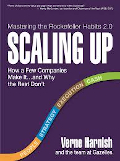|
|
|
|
|
|
|
|
|
Dear reader,
Welcome to the November 2019 edition of The Director's Dilemma. This month our dilemma is based upon the unexpected findings that can often greet a new director at their first meeting with the board.
During my twenty years' board experience I have seen a lot of dilemmas; all can be resolved when there is goodwill, a degree of skill, and a committed hard-working board of directors. Our three contributors have provided a range of ideas in response to this issue. I hope that you enjoy the insights and find them helpful in extending your governance knowledge.
To read this email in a browser, go to www.mclellan.com.au/newsletter.html and click on 'read the latest issue'. I hope you enjoy thinking about the governance and strategic implications of the latest dilemma:
 Queenie has just joined her first not for profit board and is very excited about it. She has done a short course on governance and is looking forward to applying what she learned to help a cause that she is passionate about. Queenie has just joined her first not for profit board and is very excited about it. She has done a short course on governance and is looking forward to applying what she learned to help a cause that she is passionate about.
At her first board meeting the chair introduced her to the other directors and she was surprised to hear that some of them had special titles such as donations director, finance director and members director while the rest were introduced as 'just' normal directors. Queenie was a bit surprised as her understanding was that they were all non-executive directors and, as such, jointly responsible for performance of the board's duties.
The meeting progressed pretty much as Queenie had expected it to, although each of the 'specially designated' directors gave a report about their area of focus. She did not wish to disrupt the smooth running of the meeting by asking about the titles. All appeared to be progressing well and there was nothing in any of the reports that gave her any cause for concern.
After the meeting she reread the company's constitution and found no mention of these titles and only the expected statements about directors and the board. She is mystified.
Should she ask the chair about these titles and the impact on director's responsibilities and liabilities?
Or is it something that they would expect her to know and understand?
|
|
|
|
Rod's Answer
 First and foremost, all directors are responsible for the governance of the NFP. Most corporate boards also have committees (eg remuneration, audit and finance among others). The chairs of these committees usually report to the whole board in similar fashion to the way Queenie describes the reports from these directors with specific responsibilities. This does not diminish the responsibilities of other directors in this area. Rather it spreads the load, but all directors need to ensure they are across the special reports those with specific responsibilities bring to the board and approve or otherwise interrogate such specific
input to the meeting. First and foremost, all directors are responsible for the governance of the NFP. Most corporate boards also have committees (eg remuneration, audit and finance among others). The chairs of these committees usually report to the whole board in similar fashion to the way Queenie describes the reports from these directors with specific responsibilities. This does not diminish the responsibilities of other directors in this area. Rather it spreads the load, but all directors need to ensure they are across the special reports those with specific responsibilities bring to the board and approve or otherwise interrogate such specific
input to the meeting.
Often such NFP directors will work with other volunteers and bring a broad view of operations to the board table. But they remain Directors and are not Managers.
Queenie would be quite right to discuss this with the Chair and suggest it might be more appropriate to simply call them all Directors. They could remain the key Directors responsible for keeping the board well informed in their specific areas of interest or specific expertise. The Chair could then reinforce with the board his/her appreciation for the extra tasks some Directors took on between meetings, but that all were equally responsible for board decisions in these as well as other matters.
Rod Elvish is Chair of DoggieRescue.com and a former President of the AusIMM. He is based in Sydney, Australia.
|
|
|
|
Julie's Answer

A board has the right to delegate anything that needs doing to anyone (or any organisation) that the board rationally and responsibly believes is capable of doing it. This includes delegations to members of the company's board and/or executive.
In not for profit boards there is often a tendency to use any donated expertise or energy that becomes available and many good board members are also passionate volunteers and advocates for their cause. This is great!
It is also dangerous if board members are unaware of the differences between their role as a director (non-executive and lacking formal authority unless acting with the board in a properly convened meeting) and their role as volunteers (empowered to do whatever their job description says they may, including committing the company to expenditure and other courses of action). Queenie is right to be concerned and should ask the Chair about these titles and what powers, if any, have been given along with the title to the relevant directors.
It is possibly wise to have a delegations document that sets out what is expected of each of these roles even if the current incumbents are performing well, as it will be useful when there is a succession or a need for a holiday replacement. I would advise against putting these into the constitution as the board may wish to change the delegations to better use the skills available and should not need to go through a general meeting each time it does.
Julie Garland McLellan is a non-executive director and board consultant based in Sydney, Australia.
|
|
|
|
Jim's Answer
 Queenie is in a unique position as a new board member to the not for profit board. As a new director she has every right to ask obvious questions that were not revealed to her during the recruitment of her to the board or in the company's constitution. Queenie is in a unique position as a new board member to the not for profit board. As a new director she has every right to ask obvious questions that were not revealed to her during the recruitment of her to the board or in the company's constitution.
My assumption is that these directors with special titles were in essence acting as the head or chair of specific committees like for profit boards have around audit, compensation, nominating, and other committees.
If Queenie wants to be an outstanding director, I would suggest that she serve by the 'Truth To Power' rule and always be willing to ask questions that others may not feel comfortable with. One suggestion is that the not for profit put together a Board Charter for all pertinent information about the board to use for onboarding new directors and as a guideline of expectations for the board to adhere to.
Jim Zuehlke is a Principal at Cardinal Board Services. He is based in Wayzata, Minnesota, USA.
|
|
|
|
Book review - Scaling Up.

This book by Verne Harnish is a practical 'how to' manual for founders and early stage company leaders. It contains a lot of useful tables and models that will help to prioritise and focus on the important tasks in the correct order.
It is, unfortunately, focused entirely on the executive ranks. There is scant mention of boards or directors or of the value that these can add to a small, yet fast growing, company. This is a frequent lack in start up literature and it is a shame that a book that is so useful in other areas fails to make any impact in such an important one as governance.
Having been called upon to assist start-up boards when they are approaching listing (which is a happy circumstance for most) or when they are at odds with each other, the founder, the CEO, and even the business plan (which is a most unhappy circumstance) I wish there was a book that combined the ease of reading and practical support of this book and extended into how to handle investors who request board seats for which they are not qualified, or how to resolve difficulties that arise from disparate investment horizons and risk appetites in the boardroom.
Apart from that one lack, this is a quick read and an easy source of inspiration and organisation.
Available at amazon.com.
Julie's news - In October
 Well, I can finally talk about what has been keeping me so busy for the past few months! Well, I can finally talk about what has been keeping me so busy for the past few months!
Bounty Mining, my ASX listed board has completed a refinancing and, after the frustration of watching uninformed press articles, the tedium of reading agreements for the fifth and sixth time to be sure that they are what we want them to be (and that no incautious drfting change has slipped anything unexpected into them), and the exhaustion of late nights and early mornings, I can share that (like Captain Bligh) we have been through high water in a small boat and reached a safe harbour. I don't usually acknowledge my board colleagues in public but this feat would not have been possible without the steadfast support and unflagging teamwork of the Bounty board (Rob Stewart, Kevin Jiao, and Craig Garson), the Bounty management team (CEO Jim Griffin and CFO Eryl Baron) and our advisors McCullough Robertson, KPMG, Korda Mentha and all under the eagle eye of our auditor BDO Nelson and the
compliance teams at ASX and ASIC. I can now say that the 'safe harbour' rules, whilst clearly workable, do not feel safe when you are relying on them!
Oh yes, I can now speak from experience on how the rules work and how directors can use them.
In the photo are the wonderful participants of the Governance Institute of Australia's recent Effective Director Course which was a great pleasure to facilitate and proved a very welcome disctraction from my other duties. These participants give me great hope for the future of Australia's boards with their courageous leadership and perceptive insights.
I also enjoyed meeting the boards of Corrangamite Catchment Management Authority and Goulburn Murray Water for government sector board workshops, the board of Visual Connections for a NFP Governance workshop, and the board of Toyota Australia for an international subsidiary board workshop. Different types of board have different requirements when it comes to their education programs and directors' needs. I love the variety of the work!
I am always keen to work more and will be delighted to hear from you if you would like to arrange a board strategy workshop, education session, or board performance review! Just call me on +61 411 262 470 or reply to this email for a discussion of how I might help your board.
Inspirational quote for November - This month my favourite quote is:

A note on names - A few readers have asked me where I find the names for the protagonists in each case study; I 'borrow' them from people I meet or things that I read. Queenie is an affectionate, or pet use, of the term queen - and is thought to be derived from the Old English word 'cwen', meaning 'woman' rather than a reference to the monarch or his wife. As a first name it can also mean "Royal Lady" or "Ruler". Our protagonist is wise to 'run the ruler' over the operating mode of her new board and to establish clear understandings between directors and stakeholders on 'who does what round here'.
This newsletter - If you have any ideas for improving the newsletter please let me know. If you are reading a forwarded copy please visit my website and sign up for your own subscription.
Suggestions for dilemmas - Thank you to all the readers who have suggested dilemmas. They are greatly appreciated. I will answer them all eventually. I could not write this newsletter without your help and without the generous help of all the experts who respond each month to the case studies.
Be a contributor - If you would like to attempt a response to the dilemmas for publication you will be most welcome. Simply reply to this email and let me know.
Let's connect - I use LinkedIn to share information about boards and directorship with my friends and acquaintances. If you use LinkedIn and we are not yet connected I will welcome a connection from you. You can find me at linkedin.com/in/juliegarlandmclellan.
Let me help you - I would be delighted to speak for or train your board, staff, audience and/or group. If I can help please contact me at julie@mclellan.com.au.
Farewell until the next issue (due 1 December 2019). I look forward to greeting you again then. In the interim I hope you will enjoy health, happiness and hard work as well as a lovely holiday.
Enjoy governing your corporations; we are privileged to do what we do!
Best regards,
Julie
Photo Credits: Personal images in this newsletter are provided courtesy of the contributors, course attendees and conference participants.
Disclaimer: The opinions expressed above are general in nature and are designed to help you to develop your judgement as a director. They are not a definitive legal ruling and do not constitute legal advice. Names and some circumstances in the case study have been changed to ensure anonymity. Contributors to this newsletter comment in the context of their own jurisdiction; readers should check their local laws and regulations as they may be very different.
Privacy: I am privileged to have your contact details and keep them as safely as possible. I will alert you if they are ever accessed by any unauthorised person (the technical staff at ayuda help with publishing and issuing the Director's Dilemma and have access so they can send the newsletters to you). I do not sell your details to anyone; they are kept only for the intended purpose - sending you this newsletter and helping to build the judgement of company directors by providing a safe way to consider potential responses to real life events.
|
|
|
|
|
|
|
|
|
|
|
|
|
 Queenie has just joined her first not for profit board and is very excited about it. She has done a short course on governance and is looking forward to applying what she learned to help a cause that she is passionate about.
Queenie has just joined her first not for profit board and is very excited about it. She has done a short course on governance and is looking forward to applying what she learned to help a cause that she is passionate about.
 First and foremost, all directors are responsible for the governance of the NFP. Most corporate boards also have committees (eg remuneration, audit and finance among others). The chairs of these committees usually report to the whole board in similar fashion to the way Queenie describes the reports from these directors with specific responsibilities. This does not diminish the responsibilities of other directors in this area. Rather it spreads the load, but all directors need to ensure they are across the special reports those with specific responsibilities bring to the board and approve or otherwise interrogate such specific
input to the meeting.
First and foremost, all directors are responsible for the governance of the NFP. Most corporate boards also have committees (eg remuneration, audit and finance among others). The chairs of these committees usually report to the whole board in similar fashion to the way Queenie describes the reports from these directors with specific responsibilities. This does not diminish the responsibilities of other directors in this area. Rather it spreads the load, but all directors need to ensure they are across the special reports those with specific responsibilities bring to the board and approve or otherwise interrogate such specific
input to the meeting.
 Queenie is in a unique position as a new board member to the not for profit board. As a new director she has every right to ask obvious questions that were not revealed to her during the recruitment of her to the board or in the company's constitution.
Queenie is in a unique position as a new board member to the not for profit board. As a new director she has every right to ask obvious questions that were not revealed to her during the recruitment of her to the board or in the company's constitution. 
 Well, I can finally talk about what has been keeping me so busy for the past few months!
Well, I can finally talk about what has been keeping me so busy for the past few months!
